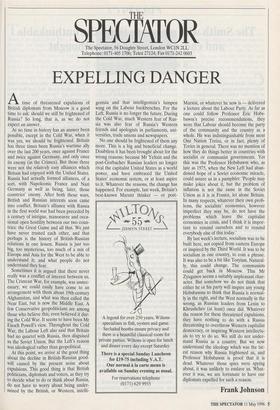SPECTATOR
The Spectator, 56 Doughty Street, London WC1N 2LL Telephone: 0171-405 1706; Telex 27124; Fax 0171-242 0603
EXPELLING DANGER
Atime of threatened expulsions of British diplomats from Moscow is a good time to ask: should we still be frightened of Russia? So long, that is, as we do not expect an answer.
At no time in history has an answer been possible, except in the Cold War, when it was yes, we should be frightened. Britain has three times been Russia's wartime ally over the last 200 years, once against France and twice against Germany, and only once its enemy (in the Crimea). But those three were not the relatively easy alliances which Britain had enjoyed with the United States. Russia had actually formed alliances, of a sort, with Napoleonic France and Nazi Germany as well as being, later, those countries' enemy. After both those wars, British and Russian interests soon came into conflict. Britain's alliance with Russia in the first world war had been preceded by a century of intrigue, manoeuvre and occa- sional open hostility between our two coun- tries: the Great Game and all that. We just have never trusted each other, and that perhaps is the history of British-Russian relations in one lesson. Russia is just too big, too mysterious, too much of a mix of Europe and Asia for the West to be able to understand it; and what people do not understand they fear.
Sometimes it is argued that there never really was a conflict of interest between us. The Crimean War, for example, was unnec- essary; we could easily have come to an arrangement with them about 19th-century Afghanistan, and what was then called the Near East, but is now the Middle East. A few Conservative geopoliticians are among those who believe this; even believed it dur- ing the Cold War. It seems to have been Mr Enoch Powell's view. Throughout the Cold War, the Labour Left also said that Britain had no quarrel with Russia, then disguised as the Soviet Union. But the Left's reason was ideological rather than geopolitical. At this point, we arrive at the good thing about the decline in British-Russian good- will caused by the present noise about expulsions. This good thing is that British politicians, diplomats and voters, as they try to decide what to do or think about Russia, do not have to worry about being under- mined by the British, or Western, intelli- gentsia and that intelligentsia's lumpen wing on the Labour backbenches. For the Left, Russia is no longer the future. During the Cold War, much Western fear of Rus- sia was also fear of Russia's Western friends and apologists in parliaments, uni- versities, trade unions and newspapers.
No one should be frightened of them any more. This is a big and beneficial change. Doubtless it has been brought about for the wrong reasons: because Mr Yeltsin and the post-Gorbachev Russian leaders no longer rival the capitalist United States as a world power, and have embraced the United States' economic system, or at least aspire to it. Whatever the reasons, the change has happened. For example, last week, Britain's best-known Marxist thinker — or post- Marxist, or whatever he now is — delivered a lecture about the Labour Party. As far as one could follow Professor Eric Hobs- bawm's precise recommendations, they were that Labour should become the party of the community and the country as a whole. He was indistinguishable from most One Nation Tories, or in fact, plenty of Tories in general. There was no mention of how they do things better in countries with socialist or communist governments. Yet this was the Professor Hobsbawm who, as late as 1975, when the New Left had aban- doned hope of a Soviet economic miracle, could assure us in a pamphlet: 'People may make jokes about it, but the problem of inflation is not the same in the Soviet Union as it is in France, let alone Britain. In many respects, whatever their own prob- lems, the socialists' economies, however imperfect they may be, do not have the problems which leave the capitalist economies in crisis, and I think it is impor- tant to remind ourselves and to remind everybody else of this today.'
By last week's lecture, socialism was to be built here, not copied from eastern Europe or inspired by the Third World. It was to be socialism in one country, to coin a phrase. It was also to be a bit like Toryism. Natural- ly, this could change. The communists could get back in Moscow. This Mr Zyuganov seems a suitably unpleasant char- acter. But somehow we do not think that either he or his party will inspire any young Hobsbawms to think that Russia is normal- ly in the right, and the West normally in the wrong, as Russian leaders from Lenin to Khrushchev (at least) once did. Whatever the reason for these threatened expulsions, they have nothing to do with a Russia threatening to overthrow Western capitalist democracy, or inspiring Western intellectu- als to try to do so. We still do not under- stand Russia as a country. But we now understand the ideology which was the lat- est reason why Russia frightened us, and Professor Hobsbawm is proof that it is dead. Whatever those spies were spying about, it was unlikely to enslave us. What- ever it was, we are fortunate to have our diplomats expelled for such a reason.
Frank Johnson


































































 Previous page
Previous page